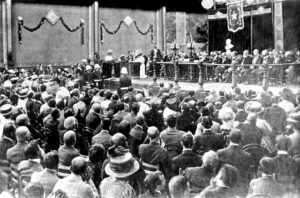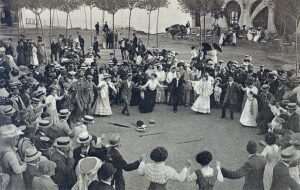The Universal Congresses were (and still are) a time of celebration in the Esperanto community. For a week, Esperantists from all over the world gathered in the chosen city and discussed the most important matters concerning their language. It was also an opportunity to build new connections and test the reliability of Esperanto in an international context. During the rest of the year, journals, books, and letters proved its efficiency, but only in these unique events did Esperantists get the chance to demonstrate the easiness with which conversation could flow among individuals with different mother tongues.
Yet these congresses were not only about the language. They were also an open door to new places. The hosting committees did not hesitate to introduce their guests to their cultures and filled their schedules with activities that best represented their traditions and peculiarities. In the end, this was (and still is) what made Esperantism different. As Hanso Becklin shrewdly pointed out in the Revuo Kontakto in the issue 300, “[…] sen povdinamiko, kiu celas garantii la regadon de aparta grupo, la Esperanta kulturo povas uzi ĉiujn ekzistantajn kulturojn kiel sian vivantan fonton. […] La Esperanta kulturo estas forumo celanta la alireblon de ĉiuj, kaj de spektantoj kaj de prezentantoj.” (“[…] without a power structure that guarantees the dominance of a certain group, Esperanto culture can use all existing cultures as a living source. […] Esperanto culture is a forum accessible to everyone, both spectators and presenters.”).

With this mindset, the possibilities were limitless, especially for those from small nations or states whose cultures struggled vis-à-vis the ever-looming threat imposed by other identities. For this reason, when after a series of turbulent events Barcelona managed to host the 5th Universal Esperanto Congress in 1909, Catalonians seized the opportunity to present themselves to the world.
During the 4th Universal Esperanto Congress in Dresden, it had been agreed that two universal congresses would be organized that year: one in Barcelona and another one in the United States. However, the idea was eventually rejected. The costs of travelling to two different congresses in two different continents would have discouraged people from attending both, and so it was decided that the one in the United States would happen in 1910 instead.
Unlike those that preceded it, the 5th meeting was formally recognized by the national authorities of the host country and king Alphonse XIII accepted the honorary presidency. The royal participation went beyond these formalities. At the beginning of the Congress and before the Esperantists gathered in Barcelona could send the King their greetings, Alphonse XIII welcomed them to the city with a telegram. Furthermore, Zamenhof was appointed Commander of the Order of Isabella the Catholic and different members of the central government, from ministers to university rectors and army officials, were included as local patrons. With the Spanish government somewhat involved, three other countries had also sent official delegations upon the request of the Ministry for Foreign Affairs: Belgium, the United States, and Norway. These first steps towards official recognition by sovereign states was of crucial importance to the movement.

Following the trend of previous congresses, a Catalan play, Misteri de dolor by Adrià Gual, was translated into Esperanto and presented to the audience. The translation of these plays started a new transnational cultural dialog in which the unknown works of regional authors could be enjoyed alongside that of the most celebrated writers. Popular dances and songs also played a pivotal role in the celebrations. Carlo Bourlet, president of the Paris Esperanto Club and one of the attendants, acknowledged the impact these representations had: “Les poésies populaires chantées par cet admirable chœur […] ; les danses locales, d’une saveur si étrange ; la pièce catalane, « Mistero de Doloro », image des mœurs catalanes, œuvre d’un Catalan, fier de sa petite patrie : tous ces spectacles harmonieusement combinés, nous ont permis de nous composer du caractère catalan une image plus précise.” (“The popular poems sang by this admirable choir […]; the local dances of such a strange taste; the Catalan play “Mistero de Doloro”, a reflection of Catalan customs, work of a Catalonian proud of his fatherland: all these harmoniously combined shows have allowed us to compose a more precise image of the Catalan character.”).

Furthermore, foreign Esperantists were encouraged to visit local museums and theatres on their own and to take part in excursions to nearby towns, cities and landmarks. The book they were provided with at the beginning of the meeting included short sentences in Catalan they could learn in order to move around Catalonia comfortably if they failed to meet local Esperantists. Yet even if during that week the Catalan lifestyle was prevalent, there was still room for other cultures to shine. At the international ball, for example, Esperantists were encouraged to wear their national costumes and, while some decided to honor Catalonia by wearing the local regional clothes, many decided to represent their home countries.
Even if only a small part of all Esperantists could afford attending Universal Congresses due to the considerable investment they required in terms of time and money, through books, reports, and articles published by all regional and national Esperanto journals, the wider community learnt more about the hosting nation. Yet their impact went beyond Esperantists. By the time the 5th Congress took place, non-Esperanto institutions had started to notice the power these events could hold. Their success helped consolidate the movement and attract new supporters while gaining formal recognition.
